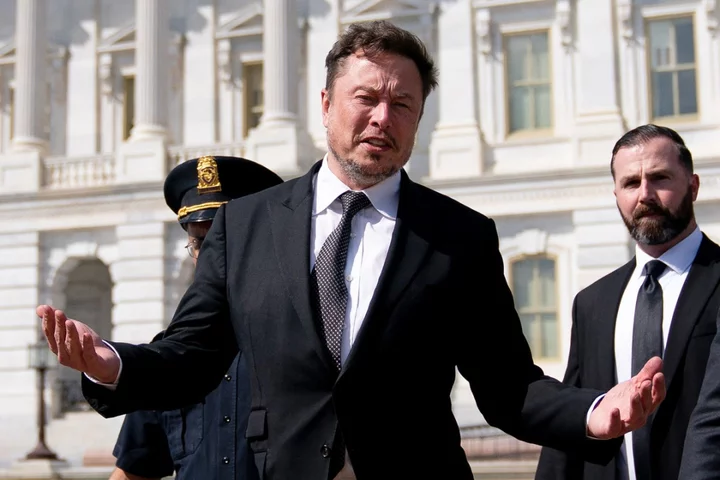
OLD Elon Musk confirms he is cutting election integrity staff from X/Twitter ahead of 2024
Elon Musk has cut staff from the X team that combats election disinformation claiming they were actually “undermining election integrity.” The platform, formerly known as Twitter, got rid of half of the global team, including four people at its Dublin office and its head, sources told The Information. Mr Musk later confirmed the move on X, stating: “Oh you mean the ‘Election Integrity’ Team that was undermining election integrity? Yeah, they’re gone.” With the 2024 US presidential election just over a year away, the team may now have only six staff members, most of them in North America, reported The Messenger. The Independent has reached out to the platform for comment on the cuts and received a message back stating, “Busy now, please check back later.” The move comes less than a month after the company announced in a blog post that it was “expanding” its “safety and elections teams to focus on combating manipulation, surfacing inauthentic accounts and closely monitoring the platform for emerging threats.” CEO Linda Yaccarino recently told The Financial Times that the platform was aiming to expand its elections and trust and safety teams. Mr Musk slashed the company’s workforce when he completed his $44bn purchase of the company, which he had repeatedly tried to back out of. In February The New York Times reported that the company had gone from 7,500 employees to fewer than 2,000 following repeated rounds of job cuts. The cuts included many from its trust and safety team, as well as senior executives in that area, such as Yoel Roth and Ella Irwin. Mr Roth, the former head of trust and safety, wrote a guest essay for the newspaper in which he revealed that following online attacks from Mr Musk and Donald Trump he has been forced to live with armed security guards outside his home and had to go into hiding for months. Read More Elon Musk to live stream himself doing ‘silly stuff’ on X Woman claiming to be Elon Musk’s wife arrested for trespassing at SpaceX plant in Texas Alexandria Ocasio-Cortez claps back at Elon Musk for calling her ‘not that smart’ Musk confirms he is cutting election integrity staff from X/Twitter ahead of 2024 Woman claiming to be Elon Musk’s wife arrested at SpaceX site in Texas At US Antarctic base hit by harassment claims, workers are banned from buying alcohol at bars
2023-09-29 02:56
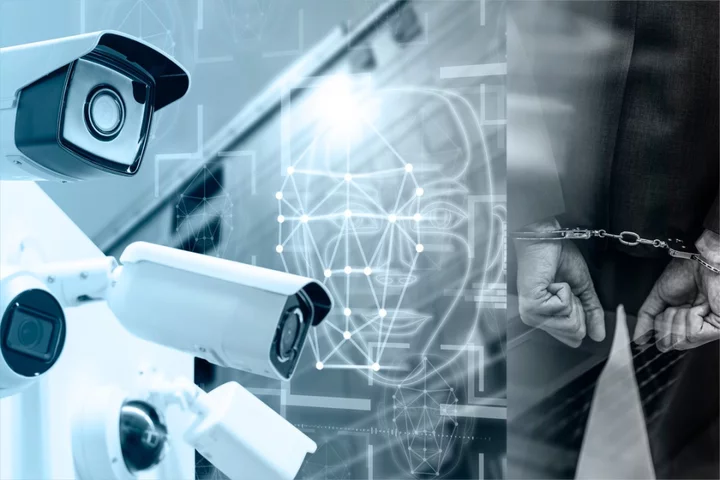
Wrongly arrested because of facial recognition: Why new police tech risks serious miscarriages of justice
On 16 February, Porcha Woodruff was helping her children get ready for school when six Detroit police officers arrived at her door. They told her she was under arrest for a January carjacking and robbery. She was so shocked she wondered for a moment if she was being pranked. She was eight months into a difficult pregnancy and partway through a nursing school programme. She did little else besides study and take care of her kids. She certainly wasn’t out stealing cars at gunpoint, she said. “I’m like, ‘What,?’ I opened my door so he could see my stomach. ‘I’m eight months pregnant. You can see two vehicles in the driveway. Why would I carjack?’” she told The Independent. “‘You’ve gotta be wrong. You can’t have the right person.’” Her children cried as she asked officers if the suspect was pregnant and insisted they had mistakenly arrested her. She was put in handcuffs and taken to jail, where she had panic attacks and early contractions. She later learned police identified her as a suspect after running security footage through the department’s facial recognition software, relying on a 2015 mugshot from a past traffic arrest into a photo lineup where the carjacking victim singled out Ms Woodruff as her assailant. The Detroit Police Department eventually dropped the case, but the arrest has deeply shaken Ms Woodruff. “What happened to the questioning? What happened to me speaking to someone?” she said. “What happened to any of the initial steps that I thought were available to a person who was accused of doing something?” The case underscores the growing risks of civil rights violations as police departments and law enforcement agencies across the country increasingly adopt facial-recognition and other mass surveillance technologies, often used as an unreliable shortcut around methodical human police work. Criminal justice advocates and the people targeted by this burgeoning police tech argue these programmes are riddled with the same biases and opaque or nonexistent oversight measures plaguing policing at large. The early results, at least, haven’t been encouraging. At least six people around the US have been falsely arrested using facial ID technology. All of them are Black. These misfires haven’t stopped the technology from proliferating across the country. At least half of federal law enforcement agencies with officers and a quarter of state and local agencies are using it. “We have no idea how often facial recognition is getting it wrong,” Albert Fox Cahn, executive director of the Surveillance Technology Oversight Project (STOP), told The Independent. “When you have facial recognition being used thousands of times, without any accountability for mistakes, it’s inviting injustice,” he added. Nowhere has that injustice been more pronounced than Detroit, a city where Black people have long experienced documented over-policing from law enforcement. Three of the six people mistakenly arrested by facial recognition technology have been in the Motor City, according to the ACLU. This status quo is why Ms Woodruff is suing DPD, claiming among other things that the agency has engaged in “a pattern of racial discrimination” against her and other Black residents “by using facial recognition technology practices proven to misidentify Black citizens at a higher rate than others in violation of the equal protection guaranteed by” the Michigan civil rights statutes. “I definitely believe that situation would’ve gone differently had it been another race, honestly, just my opinion. There was no remorse shown to me and I was pregnant. I pleaded,” she told The Independent. “Being mistaken for something as serious as that crime – carjacking and armed robbery – that could’ve put me in a whole different type of lifestyle,” she added. “I was in school for nursing. Felons cannot become nurses. I could’ve ended up in jail. That could have altered my life tremendously.” The Independent has requested comment from DPD. After Ms Woodruff filed her suit, Detroit police chief James White said in a press conference in August “poor investigative work” led to the false arrest, not facial recognition technology. He claimed that department software gave detectives numerous possible suspects and was only meant to be a “launch” point for further investigation. “What this is, is very, very poor investigative work that led to a number of inappropriate decisions being made along the lines of the investigation, and that’s something this team is committed to not only correcting, having accountability, having transparency with this community, and in building policy immediately to ensure regardless of the tool being used, this never happens,” Mr White said. He added that officers won’t be allowed to use images sourced by facial recognition in lineups, and warrants based on facial ID matches must be reviewed by two captains before being carried out. ‘The lead and the conclusion’ Some aren’t convinced these changes will prevent the excesses of what they see as a fundamentally flawed technology. “The technology is flawed. It’s inaccurate,” Philip Mayor, senior staff attorney at the ACLU of Michigan, told The Independent. “Police repeatedly assured us that it’s being used only as an investigative lead, but what we see here in Detroit time and time again is it is both being used as the lead and the conclusion.” Studies suggest that facial-recognition algorithms, which have been used to capture suspects in high-profile cases like those connected to January 6, also fail to accurately identify Black people and women, driving up inequalities in arrests, because image-training datasets often lack full diversity. However, according to Mr Mayor, police departments make things even worse by failing to do basic training and common-sense investigative work on top of facial recognition tools. He represents Robert Williams, a Detroit man who was mistakenly arrested for a 2020 theft from a high-end Detroit boutique. A security contractor employed by the store worked with the city and state police and flagged Mr Williams’ name using facial recognition tools. How police came to trust that Williams was the right man reveals the sloppiness of how facial ID tech is used in practice, according to the ACLU attorney. After the theft, police searched a database containing both past photos of Mr Williams and his present-day driver’s license. ‘It picks out 486 people who are the most likely perpetrators; not a single one of them is his current driver’s license, even though his current driver’s license is in the database that was searched,’’ Mr Mayor said. “That seems like an obvious exculpatory fact, the kind of thing that would lead you to say if you were actually thinking, this isn’t the right guy.” When these dubious matches are then used to build a line-up, questionable police work attains the gloss of near-fact, and witnesses choose from a group of people who may have no credible tie to a crime that took place but still look something like the person who did. “This is not me,” Mr Williams told police during his investigation, according to The New York Times. “You think all Black men look alike?” The father of two, after asking a local police voluntarily stop using facial recognition technology, sued the DPD in 2021. “This technology is dangerous when it doesn’t work, which is what the cases in Detroit are about. It’s even more dangerous when it does work. It can be used to systematically surveillance when we come and go from every one of the places that are important in our private lives,” the ACLU attorney said. “I don’t think there’s any reason to believe that departments elsewhere right now are not making the same mistakes.” ‘A force multiplier for police racism’ Detroit isn’t the only place grappling with the impacts – and errors – of this technology. In Louisiana, the use of facial recognition technology led to a wrongful arrest of a Georgia man for a string of purse thefts. A man in Baltimore spent nine days in jail after police incorrectly identified him as a match to a suspect who assaulted a bus driver. The Baltimore Police Department ran nearly 800 facial recognition searches last year. Those cases and others have added to a growing list of misidentified suspects in a new era of racial profiling dragnets fuelled by tech that is rapidly outpacing police and lawmakers’ ability to fix it. Facial recognition software often is “a force multiplier for police racism,” worsening racial disparities and amplifying existing biases, according to Mr Cahn. It can spur a vicious cycle. Black and brown people are already arrested at disproportionate rates. These arrests mean they are more likely to enter a database of faces being analyzed and used for police investigations. Then, error-prone facial recognition technology is used to comb these databases, often failing to identify or distinguish between Black and brown people, particularly Black women. “So the algorithms are biased, but that’s just the start, not the end of the injustice,” Mr Cahn says. Such technologies, advocates warn, are embedded in wider mass surveillance programmes that often lack robust public oversight. In New York City, law enforcement agencies relied on facial recognition technology in at least 22,000 cases between 2016 and 2019, according to Amnesty International. New York City’s Police Department spent nearly $3bn growing its surveillance operations and adding new technology between 2007 and 2019, including roughly $400m for the Domain Awareness System, built in partnership with Microsoft to collect footage from tens of thousands of cameras throughout the city, according to an analysis from STOP and the Legal Aid Society. The NYPD has failed to comply with public disclosure requirements about what those contracts – from facial recognition software to drones and license plate readers – actually include, according to the report. Until 2020, that money was listed under “special expenses” in the police budget until passage of the Public Oversight of Surveillance Technology Act. The following year, more than $277m in budget items were listed under that special expenses programme, the report found. “We’ve seen just concerted pushback from police departments against the sort of oversight that every other type of government agency has because they don’t want to be held accountable,” according to Mr Cahn. “If we treated surveillance technology vendors the way we treated other technology vendors, it would be like Theranos – police would be arresting some of these vendors for fraud rather than giving them government contracts,” he added. “But there is no accountability.” On 7 August, 2020, New York City Police Department officers in riot gear launched a six-hour siege outside Derrick Ingram’s Hell’s Kitchen apartment. Mr Ingram – a racial justice organiser who is embroiled in a federal lawsuit against the NYPD – was surrounded by more than 50 officers after he allegedly shouted into an officer’s ear at a protest earlier that summer. Police insisted they had a warrant on assault charges, but couldn’t produce one when Mr Ingram asked them to, according to his suit. The whole encounter, in which the NYPD deployed snipers, drones, helicopters, and police dogs, began with facial recognition technology. “To say that I was terrified is an understatement – I was traumatized, I still am,” Mr Ingram later testified. “I fear deep down in my core that if I opened my door to those officers, my life would be swiftly taken.” To identify Mr Ingram as a potential suspect, NYPD relied on facial recognition software “as a limited investigative tool, comparing a still image from a surveillance video to a pool of lawfully possessed arrest photos,” according to a police statement, adding that “no one has ever been arrested solely on the basis of a computer match.” The software pulls from a massive internal database of mugshots to generate possible matches, according to the department. Civil rights groups and lawmakers criticized the department’s use of facial recognition – initially hailed as a tool to crack down on violence offenders – for being deployed to suppress dissent, and triggering a potentially lethal police encounter at Mr Ingram’s home. As for Ms Woodruff in Detroit, she hopes her experience can show the dangers of relying too heavily on facial recognition technology. “It may be a good tool to use, but you have to do the investigative part of using that, too,” she said. “It’s just like everything else. You have your pieces that you put together to complete a puzzle.” Her life would’ve been a whole lot different, she said, if “someone would’ve just taken the time to say, ‘OK, stop, we’re going to check this out, let me make a phone call.’” Read More Detroit police changing facial-recognition policy after pregnant woman says she was wrongly charged White House science adviser calls for more safeguards against artificial intelligence risks How a Drake concert put NYPD’s ‘arsenal’ of surveillance technologies under the spotlight
2023-09-15 03:47

Putin praises Musk as ‘outstanding person’ days after report Tesla boss stopped Ukrainian attack
Vladimir Putin heaped praise on Elon Musk as he called the billionaire an “outstanding person” and businessman. The Russian dictator complimented the Tesla CEO and X owner just days after Mr Musk said that he refused to let Ukraine use Starlink internet to launch a surprise attack on Russian forces in Crimea. The revelation was made in excerpts of a new biography on the South African-born entrepreneur that he had refused Ukraine support for a September 2022 attack on Russian naval vessels in Sevastopol. Mr Musk reportedly refused as he did not want to be complicit in a “major” act of war, and has been heavily criticised by Ukraine’s leadership. Mr Putin was not asked about the incident during an economic forum in Vladivostok but spoke about the rocket launching success of Mr Musk’s SpaceX company. “As far as private business and Elon Musk is concerned... he is undoubtedly an outstanding person. This must be recognised, and I think it is recognised all over the world,” he said. “He (Musk) is an active and talented businessman and he is succeeding a lot, including with the support of the American state.” Last October, Mr Musk was forced to deny a report that he had spoken to Mr Putin about Russia’s unprovoked war in Ukraine. Ian Bremmer, head of the Eurasia Group political risk consultancy, had claimed that Mr Musk personally told him about the conversation with Mr Putin. “I have spoken to Putin only once and that was about 18 months ago. The subject matter was space,” Mr Musk tweeted. It came the same month Mr Musk asked his social media followers to vote on ways to resolve the bloody conflict. The suggestions included holding votes in Russian-annexed areas of Ukraine, an idea welcomed by the Kremlin. He also suggested that the rest of the world should “formally” recognise Crimea, which was illegally occupied by Moscow in 2014, as part of Russia. In response, Ukraine’s president Volodymyr Zelensky posted his own poll asking users if they liked the world’s richest person more when he supported Ukraine. Read More Elon Musk: How many children does the Tesla CEO have? Fatherhood, rows with Amber Heard and ‘the woke mind virus’: six revelations from Elon Musk’s biography Elon Musk ‘hardly remembers’ his own ‘demon-like’ episodes, biographer claims Grimes says Elon Musk was ‘clueless’ about why she was upset by C-section photo Elon Musk's refusal to have Starlink support Ukraine attack in Crimea raises questions for Pentagon Pope's Ukraine peace envoy heads to China on mission to help return Ukraine children taken to Russia Ranting Putin threatens Sunak and makes wild claim UK ‘backed nuclear plant raid’ Putin says legal cases against Donald Trump are ‘persecution of a political rival’
2023-09-13 04:57
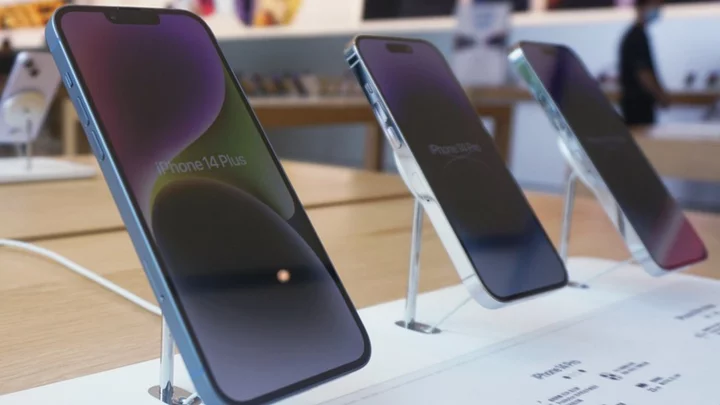
Apple shares slide after China government iPhone ban reports
The technology giant's stock market valuation has fallen by almost $200bn in the last two days.
2023-09-08 10:52
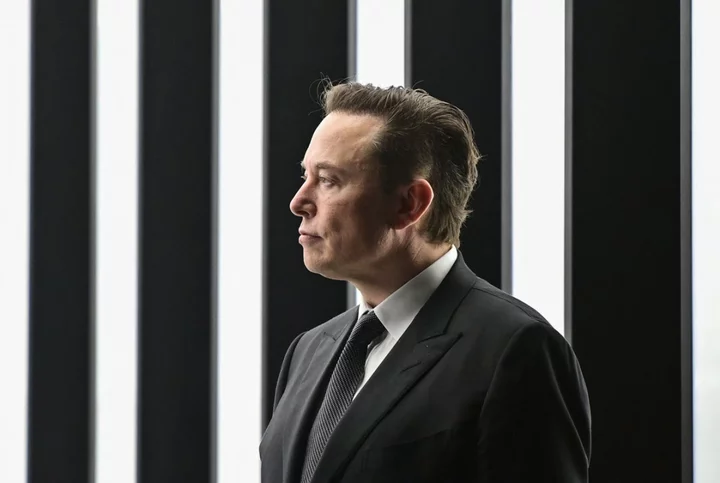
Elon Musk ‘borrowed $1bn from SpaceX’ at same time as Twitter acquisition
Elon Musk reportedly took out a $1bn loan from his company SpaceX the same month that he acquired Twitter, now known as X, according to theWall Street Journal. SpaceX approved the loan – which was secured by some of his stock in the company – in October 2022, according to the Journal. That same month, Mr Musk drew all of it down. The SpaceX founder returned the $1bn – with interest – to the company one month later, the Journal reported. It’s unclear why the richest person in the world now and in October 2022, when he took over the social media giant, took out the loan. He bought the social media company for $44bn, which seemed to contribute to him losing that top slot, until he was renamed the world’s richest person in June 2023. The publication also noted that in November 2022, when he repaid the loan, Mr Musk sold $3.95bn in shares in another one of his companies, Tesla. The following month, he sold another $3.58bn in Tesla stock. That year in total, Mr Musk had sold nearly $23bn worth of Tesla stock since April – fuelling speculation that the funds were likely going toward his social media platform acquisition. This isn’t the first time that Mr Musk has taken out money from one of his ventures to aid another. In 2009, Mr Musk reportedly borrowed $20m from SpaceX to support Tesla. More recently, in 2015 and 2016, SpaceX poured $330m in bonds into his solar panel company SolarCity. Tesla ended up acquiring SolarCity in 2016. SpaceX has recently come under fire, as the Justice Department sued the company last month for alleged hiring discrimination practices. SpaceX’s “discriminatory hiring practices were routine, widespread, and longstanding, and harmed asylees and refugees,” the filing stated. The Independent has reached out to SpaceX for comment. Read More Starship ‘ready to launch’, Elon Musk says Elon Musk calls Burning Man ‘best art on Earth’ amid chaos that saw thousands stranded and one dead Elon Musk vows to sue ADL for calling him antisemitic after he promoted antisemitic campaign on X
2023-09-06 23:15
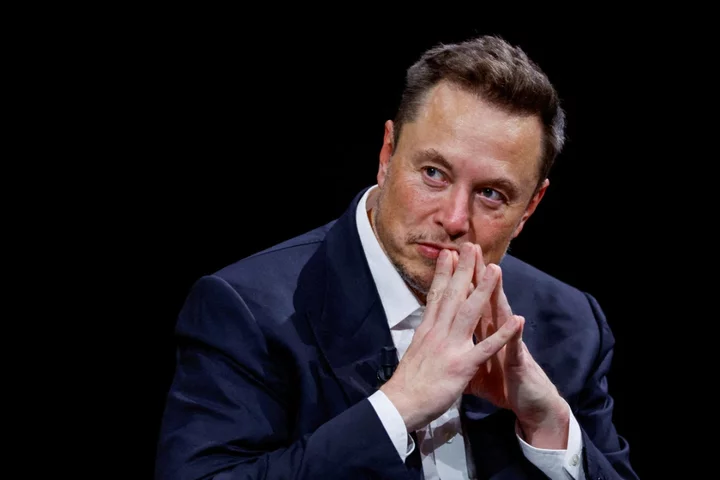
Elon Musk vows to sue ADL for calling him antisemitic after he promoted antisemitic campaign on X
Elon Musk has threatened to sue the Anti-Defamation League (ADL) for billions of dollars after quixotically blaming the Jewish rights organisation for spreading antisemitism on his social media platform X. The self-proclaimed “free speech absolutist”, who has amplified and reinstated neo-Nazi and far-right accounts since acquiring X, formerly known as Twitter, for $44bn last year blamed the ADL for “destroying” $22bn in the company’s value in a series of posts on Monday. “Since the acquisition, The ADL has been trying to kill this platform by falsely accusing it & me of being anti-Semitic,” Mr Musk wrote. He claimed that the site’s United States advertising revenue was down 60 per cent “primarily due to pressure on advertisers by ADL”. “If this continues, we will have no choice but to file a defamation suit against, ironically, the ‘Anti-Defamation’ League.” An ADL spokesperson told The Independent in a statement that it did not comment on legal threats, but added that Mr Musk was helping to boost a coordinated “Ban the ADL” campaign being waged by self-declared antisemites. “ADL is unsurprised yet undeterred that antisemites, white supremacists, conspiracy theorists and other trolls have launched a coordinated attack on our organisation. This type of thing is nothing new,” the ADL spokesperson said. “Such insidious efforts don’t daunt us. Instead, they drive us to be unflinching in our commitment to fight hate in all its forms and ensure the safety of Jewish communities and other marginalised groups.” Mr Musk’s threats to sue the ADL, a century-old NGO that describes itself as the “leading anti-hate organisation in the world”, were met with anger and disbelief from some commentators on X. “In his pursuit of some kind of utopian free speech universe, Elon Musk has turned Twitter / X into a free-for-all for Neo Nazis and White Extremists to unleash a torrent of unprecedented antisemitism and Jew hatred,” wrote Israeli human rights lawyer Arsen Ostrovsky. NYU professor Ruth Ben-Ghiat posted: “So it's the Jews manipulating others. Elon Musk that is so original!” Since Mr Musk’s takeover, advertisers have fled the platform or reduced their ad spend as hateful content was allowed to spread unchecked. Mr Musk, the world’s richest person with an estimated net wealth of $248bn, fired an estimated 80 per cent of its workforce, including most of its content moderators, and reinstated previously banned accounts. X’s US advertising revenue over a five-week period from April to May this year came to $88m, a 59 percent decrease from one year ago, according to the New York Times. In August, X filed a lawsuit against the Center for Countering Digital Hate (CCDH) after it published a report showing that moderators had failed to take action on 99 out of 100 examples of harmful content by verified “blue check” users that the organisation had flagged. “Musk is trying to ‘shoot the messenger’ who highlights the toxic content on his platform rather than deal with the toxic environment he’s created,” CEO Imran Ahmed said in a statement. “CCDH has no intention of stopping our independent research – Musk will not bully us into silence.” The Independent attempted to reach Mr Musk through X, Tesla and via a personal email address but did not hear back. Read More Elon Musk calls Burning Man ‘best art on Earth’ amid chaos that saw thousands stranded and one dead Elon Musk promotes transphobic content as hate speech surges on his far-right platform X threatens to sue researchers who accused Twitter of allowing ‘hate to prosper’ on platform
2023-09-06 00:45
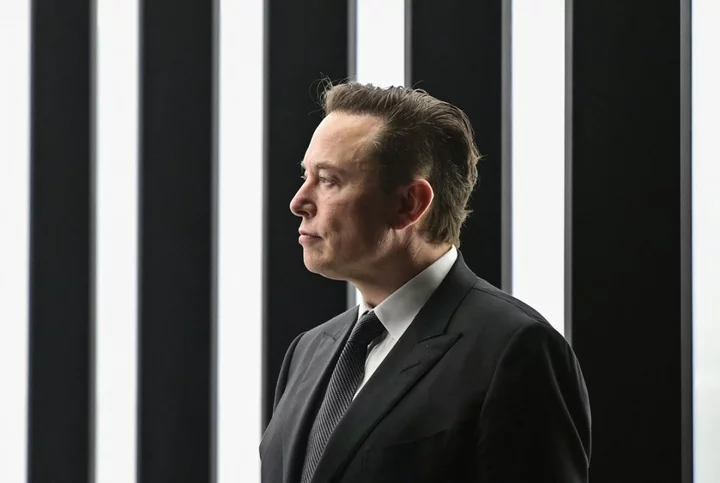
Elon Musk became ‘anti-woke’ because of his daughter’s gender transition, book claims
Elon Musk became vehemently “anti-woke” because of his daughter’s gender transition, according to a new book on the Tesla boss. The billionaire’s right-wing political leanings “were partly triggered” when his then-16-year-old child, Vivian Jenna Wilson, came out to her aunt. The claim was made by Mr Musk’s biographer, Walter Isaacson, in an excerpt from his book – entitled Elon Musk – published in The Wall Street Journal on Thursday. “Hey, I’m transgender, and my name is now Jenna,” she reportedly texted her aunt. “Don’t tell my dad.” Ms Wilson was granted a legal name and gender change last June and has severed all ties with her famous father. According to the book, Mr Musk brands his daughter a “Communist” who ended her relationship with him because she was brainwashed into “thinking that anyone rich is evil” by her $50,000-per-year school in California. Mr Musk said he “partly” blames the Crossroads School for Arts& Sciences for his daughter’s change in attitude towards him. “She went beyond socialism to being a full communist and thinking that anyone rich is evil,” said Mr Musk, who has a personal worth of $257.5bn. Mr Musk has previously blamed “woke” schools for his daughter’s transition, but it is the first time that he has named Crossroads. Mr Musk said that the rift with his daughter is the most painful thing he has experienced since the death of his first child at 10 weeks old from sudden infant death syndrome. Her mother is the Canadian writer Justine Wilson, who was married to Mr Musk from 2000 to 2008. The Independent has reached out to Crossroads for comment. Read More Twitter/X indicates it will start collecting ‘biometric information’ and ‘employment history’ KSI reveals how much money he made from Elon Musk’s new Twitter monetisation in August Tesla under federal probe over mysterious project to build ‘glass house’ for Elon Musk, report says ‘San Francisco will end up like Detroit’: Why Elon Musk and tech CEOs are fighting lawsuit on homeless crisis Elon Musk booed at video games contest as crowds shout: ‘Bring back Twitter!’ Why Elon Musk and tech CEOs are backing a lawsuit against anti-homelessness advocates Elon Musk booed at video games contest as crowds shout: ‘Bring back Twitter!’ Florida Gov. Ron DeSantis faces Black leaders' anger after racist killings in Jacksonville
2023-09-01 09:28

Nintendo Live coming to Tokyo in 2024
Nintendo Live will journey to Tokyo early next year after its North American debut.
2023-08-30 19:23
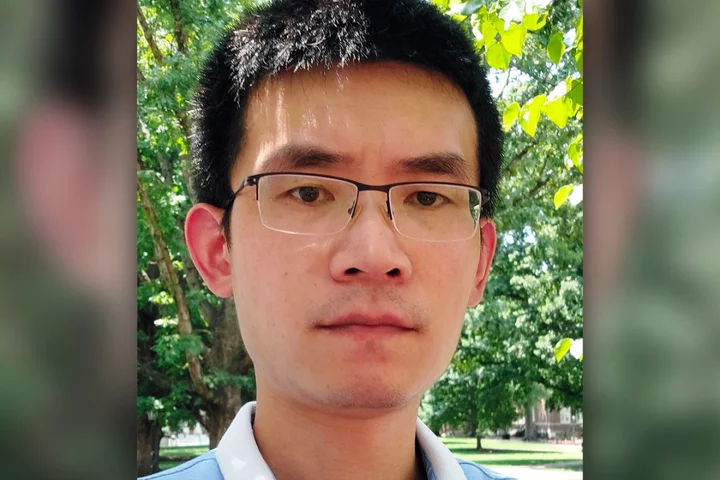
UNC Chapel Hill shooting victim identified as associate professor Zijie Yan
Authorities have identified the faculty member killed in Monday’s shooting at the University of North Carolina at Chapel Hill. UNC PhD student Tailei Qi, 34, has been charged with first-degree murder in connection with the killing of Zijie Yan, an associate professor in the Department of Applied Physical Sciences and a researcher. Mr Yan was listed as his alleged killer’s academic advisor on Mr Qi’s UNC profile, which has since been removed from the university’s website. Yan joined UNC in 2019. Before that, he was an assistant professor at Clarkson University in New York and received postdoctoral training at the University of Chicago. Mr Qi and Yan co-authored several research papers focusing on nanoscience technology. But in tweets from an account believed to belong to Mr Qi, the alleged shooter complained about “bullies and his “PI” – referring to his unnamed head of lab – being unable to handle “these girls and tattletales”. “Just have a talk with my PI and get his promise. He should have more experience to handle with these girls and tattletales,” he wrote in August 2022. Two months later in October, he referred to his PI again: “Both the group of people to say I am lazy and that to prove me working hard instead of telling me that are trying to consume my privacy. I judge their motivation is only to tell my PI then control me by taletelling.” “But it’s weird when I talked about it with my PI, he said no people spoke to him about that. so it’s nothing but some voyeurism for these people?” Yan studied undergrad at the Hauzhong University of Science and Technology, where he obtained his bachelor’s in material science and engineering and computer science in 2005. The Rensselaer Polytechnic Institute, where Yan got his master’s in physics electronics, posted a tribute on Tuesday. “He is remembered fondly by many of us that met him in the classroom, lab, or in the hallway of MRC,” a Facebook post read. “Among other things, he distinguished himself with publishing 17 journal articles in the course of his PhD study...” UNC at Chapel Hill Chancellor Kevin M Guskiewicz said in a statement on Tuesday that he has met with Yan’s family. “My leadership team and I have met with his colleagues and family to express our condolences on behalf of our campus,” the statement read. “Please join me in thinking and praying for his family and loved ones during this difficult time.” UNC police said during a press conference on Monday that a motive was not immediately evident. Mr Qi, a second-year PhD student majoring in applied physical sciences, graduated from Wuhan University in 2015 and also received a master’s in material science from Lousiana State University in 2021. The suspect joined UNC at Chapel Hill’s Yan Lab in 2022. UNC graduate student Aiden Scott, a former classmate of Mr Qi, described him as “very quiet” but “nice.” “I would have never guessed that he would be the kind of person who could possibly be capable of this kind of thing,” Mr Scott told WRAL. “Every single time he would talk to me, he seemed very nice... when I saw his face in the reports online, I was beyond shocked,” UNC has cancelled all classes on Tuesday as an investigation remains ongoing. Mr Qi is expected to appear in court later today. Read More UNC shooting – latest: Graduate student charged with murder of faculty member on Chapel Hill campus He moaned about work, ‘bullies’ and his head of lab online. Then police say he shot dead a UNC faculty member UNC shooting suspect’s social media complaints about murdered faculty member revealed
2023-08-30 03:19
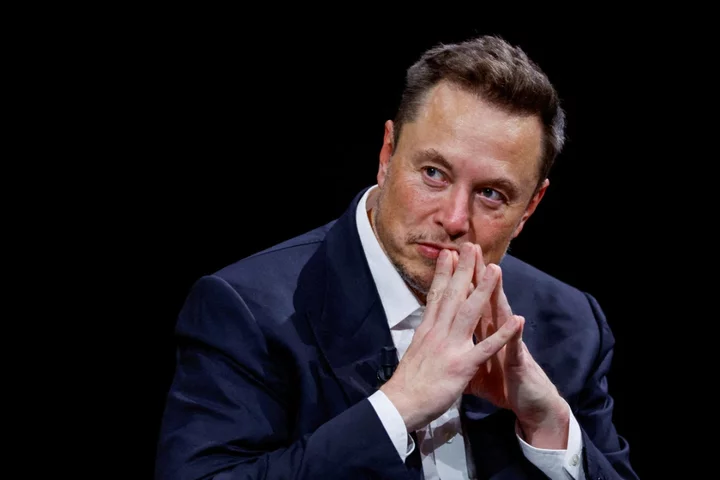
Elon Musk booed at video games contest as crowds shout: ‘Bring back Twitter!’
Elon Musk, the owner of X – formerly known as Twitter – was booed at a video game contest in Los Angeles. The audience at Valorant World Championship Final on Saturday did not seem to like Mr Musk’s takeover of the social media platform, which he then renamed. As soon as the cameras showed him, he was met with a cacophony of boos. Mr Musk was attending the tournament with one of his sons, Insider reported. A clip of the event has ironically garnered over 14m views on Mr Musk’s social media platform. “Where is that from? That can’t be from in here, surely,” one of the commentators said amid the booing after the camera aired a brief shot of the Tesla and SpaceX founder. Even after the camera returned to focus on the game play, the crowd continued to boo. Then people started chanting in unison: “Bring back Twitter!” People on X weighed in on what it means to elicit such a reaction at a video game tournament. One X user wrote: “Getting booed by Valorant players is like getting wedgies by the anime club in middle school.” Another user remarked, “Lol we want a new logo,” seemingly blasting the black “X” that replaced the blue bird as the platform’s logo. Yet another said that the boos weren’t that bad: “That was actually a very sweet chant compared to all the other things they could of chanted.” The X owner has faced consistent criticism over the changes he has made to the popular and influential social media platform since his takeover last year. On top of unhappiness over the policy changes, Mr Musk was also blasted over his decision to rebrand the site from the household name Twitter to a simple X. Last month, a giant “X” sign appeared above the company’s headquarters in San Francisco, sparking an investigation; the sign has since been taken down. This wasn’t the first harsh rebuke Mr Musk faced last week; the Justice Department sued his company, SpaceX, accusing it of hiring discrimination. Read More Elon Musk’s SpaceX sued over allegations of hiring discrimination Elon Musk’s X took two days to remove account where Laura Carleton’s killer spewed anti-LGBT+ hate Musk admits X may be doomed to fail as new glitch wipes out pictures from former Twitter platform Florida Gov. Ron DeSantis faces Black leaders' anger after racist killings in Jacksonville Trump misleadingly claims 250 million viewers watched his Tucker Carlson interview Trump insists ‘I LOVE TRUTH SOCIAL’ after making return to Twitter with mug shot
2023-08-30 02:18
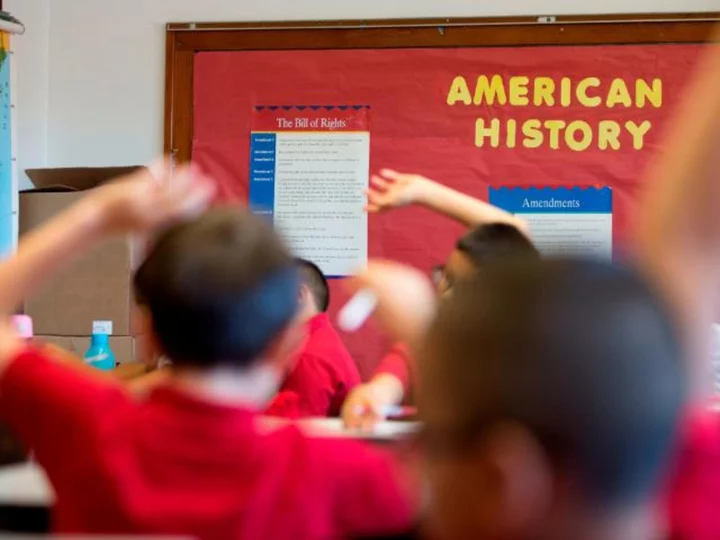
New report finds rise in parental rights education bills has a 'chilling effect'
Since 2021, state lawmakers have introduced nearly 400 bills aimed at giving parents, government officials and concerned citizens the ability to challenge or monitor what schools teach about race and gender issues, according to a new report from the free expression advocacy group PEN America.
2023-08-25 06:18
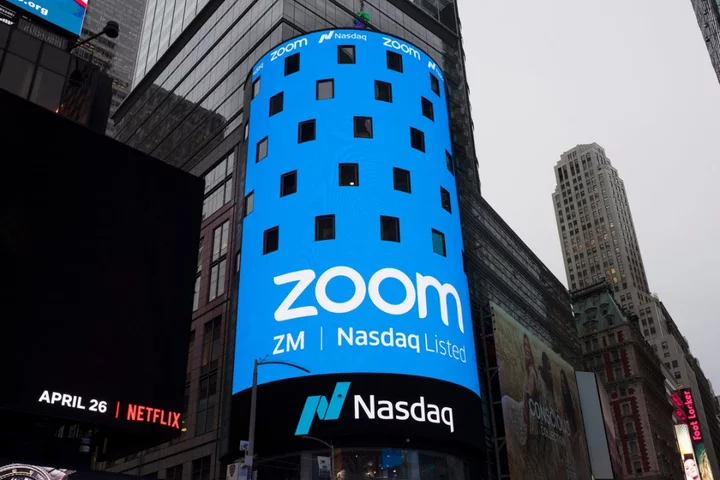
Zoom CEO raises eyebrows by saying people need to go back to the office
Zoom CEO Eric Yuan told staff an all-hands meeting earlier this month that he wants employees to return to in-person work because Zoom is making them too “friendly” and unable to build trust. “Over the past several years, we’ve hired so many new ‘Zoomies’ that it’s really hard to build trust,” Mr Yuan says in the audio, which was obtained and first reported by Insider. “We cannot have a great conversation. We cannot debate each other well because everyone tends to be very friendly when you join a Zoom call.” Mr Yuan’s thoughts were accompanied by action: On 3 August, Zoom instituted a new policy requiring employees who live within 50 miles of a physical Zoom office to report to work at least two days per week. The return to the office policy at Zoom is striking considering that it was the Covid-19 pandemic and resulting stay-at-home orders that turned the platform from one few people had ever heard of to a part of everyday life for millions. But Mr Yuan is not alone among senior executives at tech firms. Apple, Meta, and Amazon have all instituted return-to-work policies in recent months, angering employees who have enjoyed the increased flexibility afforded by work-from-home policies. Since Covid-19 vaccines have facilitated the re-opening of the economy, workers and bosses in many sectors have clashed over the importance of in-person work and the ability of companies to exercise control over their employees whereabouts and schedules. Some, like Zoom and a number of other tech companies, have adopted hybrid policies in which workers are required to come into the office on certain days of the week but are allowed to work from home on others. But even those companies have faced backlash from workers, many of whom were hired at a different stage of the pandemic when most or all work at their respective companies was being conducted remotely. Mr Yuan’s comments, which were not meant for public consumption, may provide a measure of insight into how he and other top executives truly feel about Zoom and remote work more broadly — suggesting that it somehow limits innovation by not allowing for the sometimes uncomfortable kinds of interactions that can build trust. Mr Yuan, who was born and raised in China, moved to Silicon Valley during the late 1990s. He founded Zoom more than a decade ago and became a multibillionaire during the pandemic. Read More Maui residents are still reeling from wildfire devastation. Now investors and realtors are trying to cash in
2023-08-25 03:25
